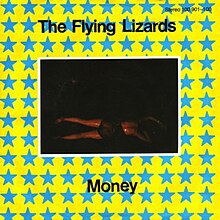
William "Smokey" Robinson Jr. is an American R&B and soul singer, songwriter, record producer, and former record executive. He was the founder and frontman of the pioneering Motown vocal group the Miracles, for which he was also chief songwriter and producer. He led the group from its 1955 origins, when they were called The Five Chimes, until 1972, when he retired from the group to focus on his role as Motown Records vice president. Robinson returned to the music industry as a solo artist the following year. He left Motown in 1999.
Motown is an American record label owned by the Universal Music Group. It was founded by Berry Gordy Jr. as Tamla Records on January 12, 1959, and incorporated as Motown Record Corporation on April 14, 1960. Its name, a portmanteau of motor and town, has become a nickname for Detroit, where the label was originally headquartered.

Road Runner is a 1966 album by Junior Walker & the All-Stars. The band's second album, it reached #6 on Billboard's Top R&B Albums chart and #64 on Billboard's Top Albums chart, launching four hit singles. First released on record by Motown's Soul label in the US and Tamla/Motown internationally, it has been multiply reissued on cassette and compact disc. It has also been remastered and reissued in conjunction with the band's following studio record, Home Cookin', as Road Runner & Home Cookin'.

Mary Esther Wells was an American singer, who helped to define the emerging sound of Motown in the early 1960s.
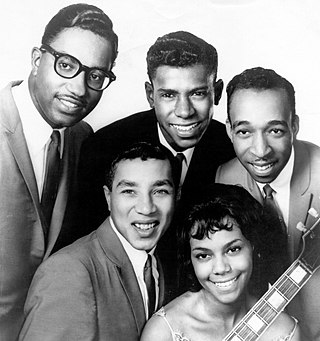
The Miracles were an American vocal group that was the first successful recording act for Berry Gordy's Motown Records, and one of the most important and most influential groups in the history of pop, soul, R&B and rock and roll music. The group's international fame in the 1960s, alongside other Motown acts, led to a greater acceptance of Rhythm & Blues and pop music in the U.S., with the group being considered influential and important in the development of modern popular music.

"I Heard It Through the Grapevine" is a song written by Norman Whitfield and Barrett Strong for Motown Records in 1966. The first recording of the song to be released was produced by Whitfield for Gladys Knight & the Pips and released as a single in September 1967. It went to number one on the Billboard R&B Singles chart and number two on the Billboard Pop Singles chart and shortly became the biggest selling Motown single up to that time.
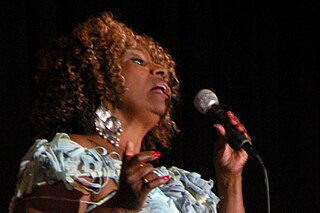
Brenda Holloway is an American soul singer who was a recording artist for Motown Records during the 1960s. Her best-known recordings are the hits "Every Little Bit Hurts", "When I'm Gone", and "You've Made Me So Very Happy". The latter, which she co-wrote, was later widely popularized when it became a Top Ten hit for Blood, Sweat & Tears. She left Motown after four years, at the age of 22, and largely retired from the music industry until the 1990s, after her recordings had become popular on the British "Northern soul" scene.

Barrett Strong Jr. was an American singer and songwriter known for his recording of "Money ", which was the first hit single for the Motown record label. He is also known for his songwriting work in association with producer Norman Whitfield; together, they penned such songs as "I Heard It Through the Grapevine", "War", "Just My Imagination ", and "Papa Was a Rollin' Stone".
"Stubborn Kind of Fellow" is a 1962 song recorded by Marvin Gaye for the Tamla label. Co-written by Gaye and produced by William "Mickey" Stevenson, "Stubborn Kind of Fellow" became Gaye's first hit single, reaching the top 10 of the R&B chart and the top 50 of the Billboard Hot 100 in late 1962.

"Please Mr. Postman" is a song written by Georgia Dobbins, William Garrett, Freddie Gorman, Brian Holland and Robert Bateman. It is the debut single by the Marvelettes for the Tamla (Motown) label, notable as the first Motown song to reach the number-one position on the Billboard Hot 100 pop singles chart. The single achieved this position in late 1961; it hit number one on the R&B chart as well. "Please Mr. Postman" became a number-one hit again in early 1975 when The Carpenters' cover of the song reached the top position of the Billboard Hot 100. "Please Mr. Postman" has been covered several times, including by the British rock group the Beatles in 1963. The 2017 song "Feel It Still" by Portugal. The Man draws on "Please Mr. Postman" and includes a credit for Brian Holland.

"You've Really Got a Hold on Me" is a song written by Smokey Robinson, which became a 1962 Top 10 hit single for the Miracles. One of the Miracles' most covered tunes, this million-selling song received a 1998 Grammy Hall of Fame Award. It has also been selected as one of The Rock and Roll Hall of Fame's 500 Songs that Shaped Rock and Roll. It was recorded by the Beatles for their second album, With the Beatles (1963). Many other musicians also recorded versions.

That Stubborn Kinda Fellow is the second studio album by Marvin Gaye, released on the Tamla label in 1963. The second LP Gaye released on the label, it also produced his first batch of successful singles for the label and established Gaye as one of the label's first hit-making acts in its early years.

"Shop Around" is a song originally recorded by the Miracles on Motown Records' Tamla subsidiary label. It was written by Miracles lead singer Smokey Robinson and Motown Records founder Berry Gordy. It became a smash hit in 1960 when originally recorded by the Miracles, reaching number one on the Billboard R&B chart, number one on the Cashbox Top 100 Pop Chart, and number two on the Billboard Hot 100 chart. It was the Miracles' first million-selling hit record, and the first-million-selling hit for the Motown Record Corporation.

Marvin Earl Johnson was an American R&B singer, songwriter and pianist. He was influential in the development of the Motown style of music, primarily for the song "Come to Me," which was the first record issued by Tamla Records, the precursor to the famous label.
"For Once in My Life" is a song written by Ron Miller and Orlando Murden for Motown Records' Stein & Van Stock publishing company, and first recorded in 1965.
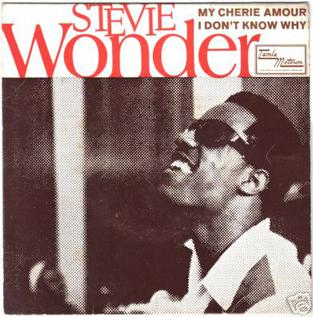
"My Cherie Amour" is a 1969 song by Motown singer-songwriter Stevie Wonder. The song reached number 4 on the Billboard pop chart in August to be Wonder's third top ten hit. The song was co-written by Wonder, Sylvia Moy, and Henry Cosby; Cosby also served as producer of the song. At the end of 1969, the song was ranked number 32 for the year.
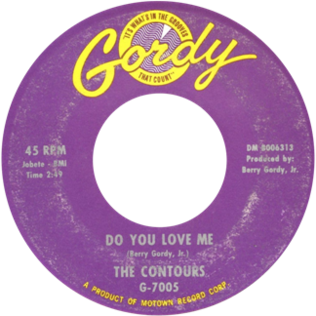
"Do You Love Me" is a rhythm and blues song recorded by the Contours in 1962. Written and produced by Motown Records owner Berry Gordy Jr., it appeared twice on the Billboard Hot 100 chart, reaching numbers three in 1962 and eleven in 1988.

Hi... We're the Miracles is the first album by The Miracles, Motown's first group, released on Motown's Tamla subsidiary label in January 1961. It was the first album released by the Motown Record Corporation. The album features several songs that played an important role in defining The Motown Sound and establishing songwriters Smokey Robinson and Berry Gordy.
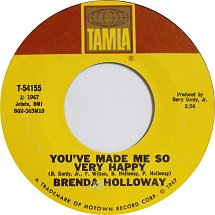
"You've Made Me So Very Happy" is a song written by Brenda Holloway, Patrice Holloway, Frank Wilson and Berry Gordy, and was released first as a single in 1967 by Brenda Holloway on the Tamla label. The song was later a huge hit for jazz-rock band Blood, Sweat & Tears in 1969, and became a Gold record.
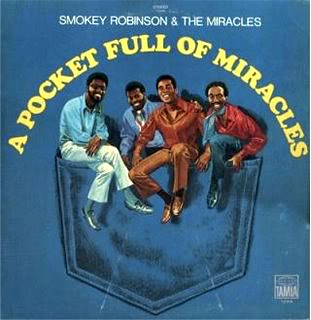
A Pocket Full of Miracles (TS306) is a 1970 album by Motown Records R&B group The Miracles, issued on its Tamla subsidiary label, one of three albums the group released that year. This album charted at #56 on the Billboard pop albums chart, and reached the top ten of the magazine's R&B albums chart, peaking at #10. It was released on September 30 of that year. Hit singles on the album included "Point It Out" and the topical Ashford & Simpson written-and-produced song "Who's Gonna Take the Blame", a sad, dark song about a girl that is turned out as a prostitute. Also included is the charting flip side "Darling Dear", B-side of "Point It Out", which reached #100 on the Billboard pop chart, and spawned a cover version by The Jackson Five.


